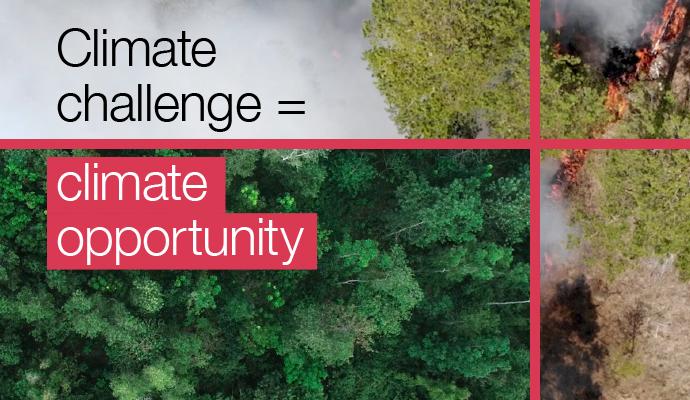An Optimist’s Case for Climate Policy
Gernot Wagner, an economist with the Environmental Defense Fund, believes business will push for policy change.
Times are tough these days for environmentalists concerned about global warming. The political environment in North America has become downright chilly: The debate in the United States is heavily influenced by conservatives who insist global warming is a hoax, and centrists and liberals are unwilling to push for new policy action because they lack the necessary votes in Congress and fear being characterized as anti-business. Canada is moving aggressively to develop its vast (and dirty) reserves of oil sands. Even in Europe, long a climate leader, more immediate worries about economic growth, monetary and fiscal policy, and the future of the euro leave little room on the policy agenda for other concerns.
Meanwhile, global carbon emissions continue to increase at higher rates than experts had anticipated even a few years ago, as more evidence of the effects of global warming emerges, and oil exploration and development continue apace.
Despite these portents of climate gloom, Gernot Wagner, an economist at the Environmental Defense Fund in New York, remains optimistic that the policy debate will shift back toward the environmental position, and he sees encouraging signs of change in the marketplace. Wagner is the author of But Will the Planet Notice: How Smart Economics Can Save the World (Hill and Wang, 2011), which came out in paperback in September 2012. He discussed the outlook for climate policy with strategy+business earlier this year in New York.
S+B: Few business policymakers seem to doubt the evidence of climate change, but a fair number are uncertain about how aggressively we should act. Do you see the business community, on balance, supporting comprehensive policy action?
WAGNER: The only doubt that serious people have is the exact extent to which global warming is happening. This is something that businesspeople understand. It’s basic option theory: If there is a potentially irreversible situation, you want to keep open the option of avoiding it, or at least be able to do something about it later. Everything we know about option theory and climate change tells us we should be doing more now.
If you happen to be in the global auto business, the fact that extreme weather events can shut down a quarter of the global supply chain matters — not in a few decades, but right now. In recent cases like the flooding in Thailand or the earthquake in Japan, you see the impact in your quarterly earnings. In general, you may not see the impact of climate change so immediately, but there’s a reason that the world’s biggest insurance companies are the ones sounding the alarm and the ones with the most ambitious goals for global warming policy. These insurers of last resort see external events increasing every year, decade after decade.
S+B: You’re optimistic that policy will change. Where do you see encouraging trends?
WAGNER: In the U.S., what the Environmental Protection Agency is doing right now — using the Clean Air Act to reduce greenhouse gases under the legal authority that was affirmed by the Supreme Court — is fantastic. And California will have a cap and trade system in force January 1, 2013. California took the lead on vehicle emissions standards, and with the new nationwide rules the Obama administration has put in place, California’s standard has, in effect, gone national. None of these is quite enough to solve global warming, but they all point in the right direction.
S+B: How about in developing countries?
WAGNER: It’s interesting. The climate bill that fizzled in the U.S. Senate a couple of years ago mentioned two countries on its first page, in the context of “if they don’t act, we won’t”: China and India. Well, they are acting.
Today, China is setting up seven regional cap and trade trials as part of its 12th five-year plan, including one in Beijing. And if they apply one of those nationwide as part of the 13th five-year plan, it will be a very big deal indeed. India has enacted a coal tax — US$1 per ton on imported and domestic coal. Again, that’s not enough to stop global warming, but these are certainly steps in the right direction.
S+B: In Europe, there seems to be less impetus for environmental policy change than there was a few years ago.
WAGNER: The fiscal crisis has clearly hurt the effort. But there is a bubbling renewables revolution under way. Denmark gets on average about 20 percent of its electricity from wind. You don’t necessarily think of the manufacturing powerhouse of Europe as a particularly sunny place, but Germany at times gets more than 50 percent of its electricity from the sun. Once you find steel plants that are being powered by solar energy, that’s when you know a renewables revolution is happening. Those are amazing policy successes.
The renewable energy revolution may be somewhat below most radars, but it’s global, and, frankly, it’s pretty astonishing. Worldwide solar and wind capacity now tops 300 gigawatts — three times as much as the total capacity in Britain. That capacity produces as much electricity as about 50 nuclear reactors, half the entire U.S. nuclear fleet. Solar installations have increased by 50 percent per year, every year, five years in a row. For wind, the growth rate is more than 25 percent. Solar prices have decreased by two-thirds within three years. Solar right now competes with electricity piped over the grid in certain areas, despite a playing field tilted in favor of coal and oil (because they’re not paying for their pollution). In the U.S., solar nationwide costs about 15 cents per kilowatt-hour right now. That’s more expensive than coal-fired electricity in Ohio, which has a famously dirty coal fleet, but it is competitive in places like Southern California.
S+B: What do you see as business’s role in pushing for policy change?
WAGNER: I see the demand for action, in a sense, coming from industry. Anyone who does long-term planning — whether their business is producing electricity, steel, or hamburgers — should be in favor of putting rules in place sooner rather than later. We all know these rules are inevitable. It’s just a question of “when,” not “if.” And for anyone wanting to do any kind of planning, sooner is always better.
Some businesses, of course, will be better prepared to deal with this than others, and it’s the ones that prepare now that will have a competitive advantage going forward. You don’t have to believe every word Michael Porter, Andrew Winston, and others are saying to realize that there are long-term advantages in making sure your company is positioned to succeed in a world where large-scale policy change will happen.
S+B: Is there a good example of an industry that’s taken this to heart?
WAGNER: Yes, and ironically, it’s often those with the biggest carbon footprint and energy bills. The aluminum industry is one of the most energy intensive of all industries, and, basically, the entire aluminum supply chain — from Rio Tinto to Alcoa to Pepsi — has been an advocate for a comprehensive cap and trade system. These companies realize that their business models will change going forward, and that there may be things that need to happen if they’re going to survive and thrive in a low-carbon world. They are trying to minimize their footprint right now — out of necessity, because their energy bills are so large — and at the same time have been advocating for the larger policy changes that could really make a difference.
Alcoa has a plant in Indiana that would have been shut down, with 2,100 jobs lost, had it not been for the fact that it could use demand response to its advantage in a big way. The company came up with a plan to cycle the plant’s electricity use up and down very quickly, so that it’s not using power during periods of peak electricity demand and can cycle up when demand is low. That kind of service is extremely valuable to utilities and to the stability of the grid, and it made business sense for Alcoa.
S+B: Given the partisan opposition to cap and trade, do you think it will continue to be the preferred approach for reducing greenhouse gases?
WAGNER: I’m under no illusion that we’ll see cap and trade happen in D.C. anytime soon. It’s simply too toxic. There is hope for a carbon tax as part of fundamental tax reform. What is clear is that an increasing number of businesses are seeing that the alternative — direct EPA regulation — simply isn’t the answer.
In the end, I’d say the reason it’s a partisan issue is essentially a misunderstanding of what it is all about. Cap and trade is a classic libertarian approach — conservative in both the lowercase and uppercase senses. It is not about stopping capitalism; it’s about creating markets, making sure everyone pays for the pollution they create. And we know that it works. The best example we have is the U.S. cap and trade system for acid rain that was put in place in the mid-1990s. It solved that problem in a cost-effective, bipartisan way. The cap and trade systems being put in place around the world — in Europe, Australia, China, and also California — are all using that system as a point of departure. ![]()
Author profile:
- Rob Norton is a freelance writer and editor based near New York, and a contributing editor to strategy+business.





